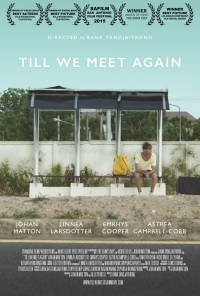
Today marks the last installment of “Making Till We Meet Again“, a series of interviews with the creators of the award-winning indie film in question. Focused on a handful of tourists making their way through Thailand, many of the questions and answers to date [with director Bank Tangjaitrong and actor/writer Johan Matton] have revolved around depicting another country and culture given that framework.
Actor Emrhys Cooper is the last person to share with us, in particular about how both he and his character, David, have experienced being in the South East Asian country as visitors and guests. Fair warning, this interview contains mild spoilers for Till We Meet Again.
David tells Joanna that being in Thailand “realigns you with who you really are.” Had you been there prior to filming Till We Meet Again? Do you think there’s any truth to that?
Yes, for many reasons South East Asia has pulled me into its orbit. That powerful land mass includes a major portion of this planet’s populations, including both India and China which are the two of the most densely populated nations on earth.
At the naïve age of 18 I went on a backpacking tour of Thailand. What an incredible experience that was. Then, in 2013, I was back again as I was cast in a movie called Kushuthara which shot in Bhutan. That’s a tiny country located up in the Himalayan mountains between India and China; one must go via Bangkok to get there.
This year I returned to Thailand to shoot another movie in Bhutan. I was lucky to get to spend New Year’s Day in Bangkok, followed by an impromptu trip to Vietnam. When I finished shooting in Bhutan I went to Cambodia, which is a country any person interested in animal protection should see. The elephant sanctuary reminds us that we are not God’s greatest creatures, but only the caretakers of his best and most precious treasures. To hear and see an elephant in all its glory, means more than any person’s hug or kiss. All human beings who value our animal companions, both great and small, should understand this.
Traveling helps realign you; travellers look to find themselves or something that will help them grow. In that sense, traveling is one of the greatest therapies. It belongs alongside the couch of Sigmund Freud as a great tool for our minds, to escape from a solely interior world.


